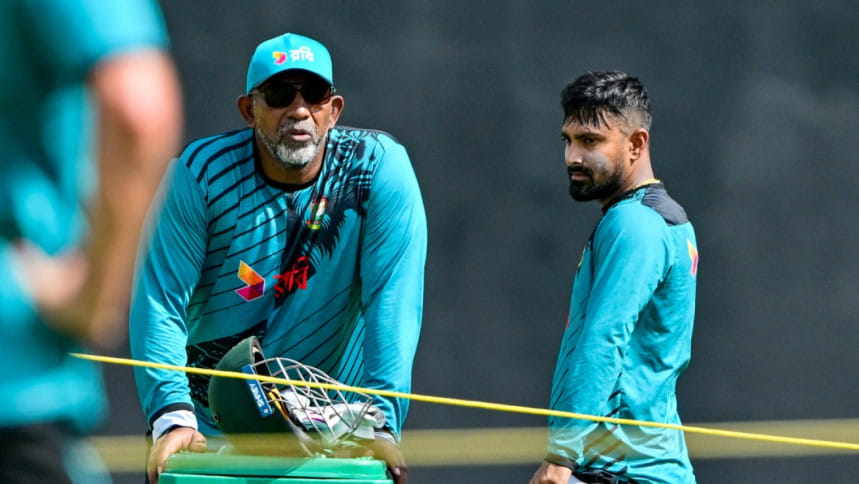Can Litton and Co’s recurring batting ailments be cured?

Batting is often all about confidence, even if the idea seems clichéd or overused. Modern T20 cricket is defined by aggression, where batters play their shots from the get-go. Without confidence in one's natural abilities, it remains a difficult prospect for any batter to find an approach or consistency in the format.
The particular case of Litton Das' struggles gives rise to the feeling of an unknown ailment pegging away at belief and confidence. If the problem is a lack of confidence, what is the cure?
Throwback to November 2, 2022, during the T20 World Cup in Australia: the wicketkeeper-batter was taking apart a world-class India bowling attack in Adelaide with a 27-ball 60 – an innings where he let go of his inhibitions. He drove menacingly, came down the track or scooped, as if reading what the bowlers were trying to do. That same mojo has not been recreated in a T20I game since.
Before rain interrupted, Bangladesh were well ahead of the DLS score. Litton slipped while running a double just after the break and was run out in unfortunate fashion. Catastrophically, the middle order collapsed, and they went on to lose by five runs via the DLS method.
It remained a heartbreak -- for the team and for him -- and not being able to carry the side to victory, even after such an impact, may have left a scar.
Yet, the innings showed what he is capable of. Why does it not materialise more often? Winning can significantly affect mindset. Also, as a Bangladesh batter, you do not often get wickets like those in Adelaide. The true bounce there enabled the carnage. He looked in his element.
That's often the case for any top batter when they get going. But what happens when the surface is low or slow? Timing shuts down. Leading edges and top edges become the norm when trying to hit out. Against quality pace, producing shots becomes harder without a clear idea of the bounce.
The year 2022 saw Litton find an incredible flow of runs. But his batting began to dither later on. At one point, he started manufacturing shots, which saw him struggle – the focus wavering. Many of his dismissals during the recent barren patch could be attributed to such forced strokes.
Captaincy, however, might have influenced his recent innings -- particularly the 76 in the second T20I against Sri Lanka in Dambulla, the highest score by a Bangladesh T20I captain.
Looking back at that knock, Litton bided his time at the crease. He scored seven off his first 11 deliveries, with the innings developing similarly to the first T20I, where he had scored six off 11. In the second game, he found a way to keep ticking, even while taking risks. His acceleration only came after the 15th over -- not very characteristic, but effective.
It was about taking responsibility despite the slow build-up.
"I always had the belief. I never had a shortage of belief in my ten years at this level. I think hunger was a factor," Litton said after the series win.
"I wasn't scoring runs for a long time. I was looking for an opportunity to grab. It was a plus point in the second T20I. I think winning changes the face of the team. We also won the second game by 83 runs, which is a huge achievement. The whole team had the confidence of winning if we played our best cricket."
Although he spoke about turning things around as a team, winning the game after that innings was certainly a personal milestone.
'Batters may fail'
A win validates the effort a player puts in. But he would know better than most that the outcome does not always match the effort. For a touch player like him, the pitch is always at the back of the mind.
So, when he spoke of the upcoming Pakistan series, it was the wickets he mentioned first.
"I don't know how the Mirpur wicket is going to behave for the Pakistan series. I think it is raining in Dhaka every day, so wicket can be difficult for batting in such conditions. Batters may fail there, but we won't be too disappointed. We will keep trying to give our 100 per cent," he had added.
"Batters may fail" was the obvious clue.
He is not the first to raise concerns over home wickets. Former three-format skipper Najmul Hossain Shanto had regularly called for better white-ball surfaces at home, even pointing out that the practice wickets were not ideal for developing fluent batting.
On the day of the third T20I, BCB cricket operations chairman Najmul Abedeen Fahim also voiced concern over producing high-quality wickets in Dhaka's prevailing wet conditions.
If wickets are not up to standard, they do not prepare the batters for major events, where sporting tracks are the norm. The 30-year-old has been shaped by these home surfaces – and with that comes flaws and tendencies picked up from low and slow pitches, habits that do not serve fluent T20 batting.
Can Litton's mojo return?
"I can try hard. I don't sit in the hotel room. I don't miss training sessions. You have to keep trying as a player. You also need blessing from God. I think luck smiled at me in the second T20I. But I keep trying hard on and off the field," the 30-year-old had said at Wednesday's press conference.
Yet, for Litton's natural game to flourish -- and for others in the batting unit -- BCB must find a solution. Talks of new grounds and facilities have emerged in the media. But until they materialise, he and his teammates will continue to wonder what the cure is for their persistent batting ailments.

 For all latest news, follow The Daily Star's Google News channel.
For all latest news, follow The Daily Star's Google News channel. 








Comments